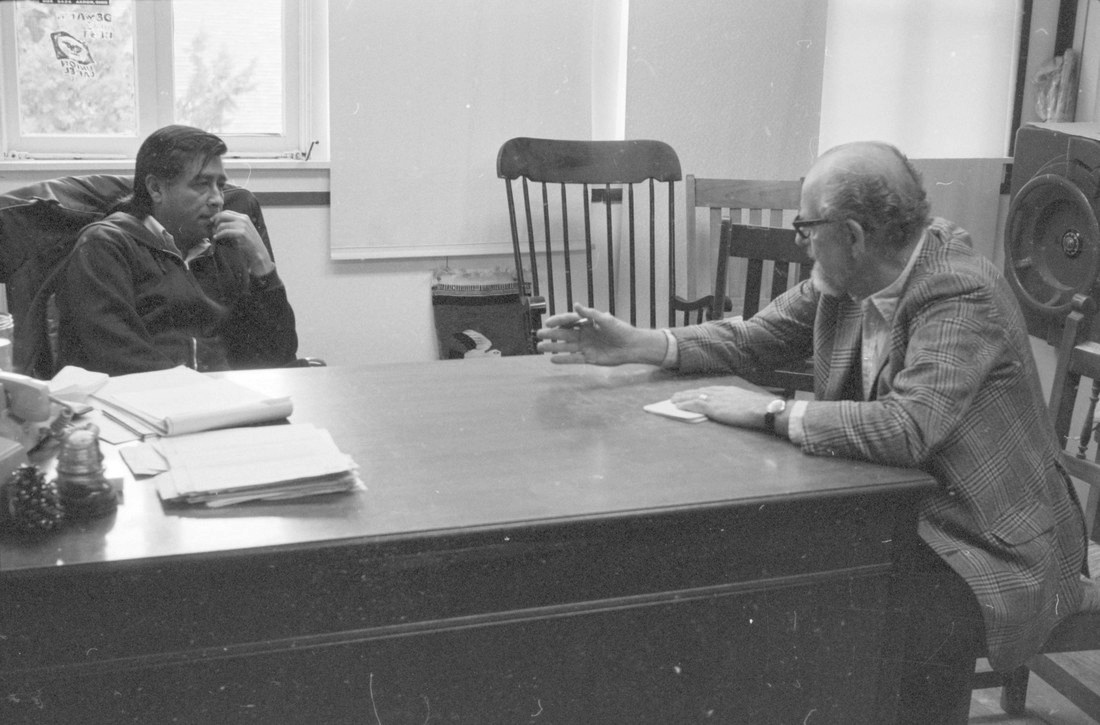
Photo: AFSC Archives
Cesar Chavez was a labor leader and civil rights activist who dedicated his life to improving working conditions and rights for farmworkers in the U.S. As a staunch nonviolent activist, he sought justice through peaceful means and often worked alongside AFSC.
Early life and experiences
Born on March 31, 1927, near Yuma, Arizona, Cesar experienced economic injustice from an early age. During the Great Depression, his family lost their homestead to foreclosure and joined over 300,000 others who migrated to California in search of better opportunities.
After eighth grade, Cesar left school to become a full-time farm worker. He experienced the harsh conditions and indignities that laborers faced daily for the benefit of growers. Later in life, he reflected, “It’s ironic that those who till the soil, cultivate and harvest the fruits, vegetables, and other foods that fill your tables with abundance have nothing left for themselves.”
In 1946, he joined the U.S. Navy for two years before returning to farm work. He also married Helen Fabela, with whom he had eight children.
In the 1950s, AFSC began advocating with migrant farmworkers for basic services such as access to water. In 1952, Cesar started work as a voter registration organizer for Community Service Organization (CSO), a Latino civil rights organization supported by AFSC. There, he learned organizing techniques under renowned community organizer Fred Ross. Cesar would later become the CSO's national director. In 1962, Cesar left the organization to co-found the National Farm Workers Association (NFWA) with Dolores Huerta.
Uniting workers
One of the key moments in Cesar’s career—and labor history—was the Delano grape strike and boycott. The strike began in 1965, led by the Agricultural Workers Organizing Committee (AWOC), a predominantly Filipino labor organization advocating for higher wages and better working conditions.
The NFWA joined the strike a week after it began, uniting Mexican and Filipino workers in an unprecedented partnership. Through grassroots organizing, consumer boycotts of non-union grapes, marches, and hunger strikes, the movement garnered widespread national attention and support. In 1970, the strike finally resulted in victory, with a collective bargaining agreement that improved workers’ pay, health, and other benefits.
During that time, the NFWA merged with AWOC to form the United Farm Workers (UFW). AFSC staff championed the establishment of the UFW by providing meeting places and funding the union’s chief negotiator. AFSC also started a fund for striking workers and their families and provided organizational and administrative support.
Under Cesar’s leadership, the UFW negotiated hundreds of contracts for farm workers and spearheaded the passage of the landmark Agricultural Labor Relations Act in 1975. The law gave farm workers in California the right to unionize and negotiate for better wages and working conditions. It was one of the first laws of its kind, paving the way for labor reform across the country.

Photo: John Sullivan/AFSC Archives
A legacy of nonviolence
Throughout his life, Cesar’s efforts were deeply rooted in his commitment to nonviolence. Even as social unrest grew, he urged others to pursue social change through nonviolent action. In a 1968 letter to AFSC, Cesar wrote:
“There's a creeping danger that we may find ourselves as solitary figures preaching non-violence in the desert of turmoil. More people must understand and love the ideal and it is this job that we're concerned with.”
For his decades of work, AFSC nominated Cesar for the Nobel Peace Prize three times during his life, with the first nomination in 1971. In the nomination letter, AFSC highlighted his longtime work for human dignity, his leadership, and his personal commitment to the cause.
“Cesar Chavez is and has remained a simple member of the very movement he leads,” the letter read. “The spiritual strengths he draws upon are those of the people who have forever worked someone else's land. His life expresses the basic values and faith of the people as well as his words and deeds.”
Cesar passed away on April 23, 1993, in San Luis, Arizona. Although he never won the Nobel Peace Prize, he posthumously received the Presidential Medal of Freedom in 1994. He left behind a legacy of empowerment and collective action, demonstrating the power of everyday people coming together to enact change. Beyond labor rights, Cesar’s work was crucial in the broader movement for civil rights in the United States, linking the struggle for farmworkers' rights to the larger movement for social justice.
Today, Cesar’s impact is evident in AFSC’s work with farmworkers in California’s Central Valley, Oregon and Washington, New Mexico, and many communities around the world. His principles of nonviolent action, grassroots organizing, and unwavering commitment to workers' rights continue to guide AFSC's approach to economic justice initiatives. Learn more about AFSC’s work for economic justice for all.
